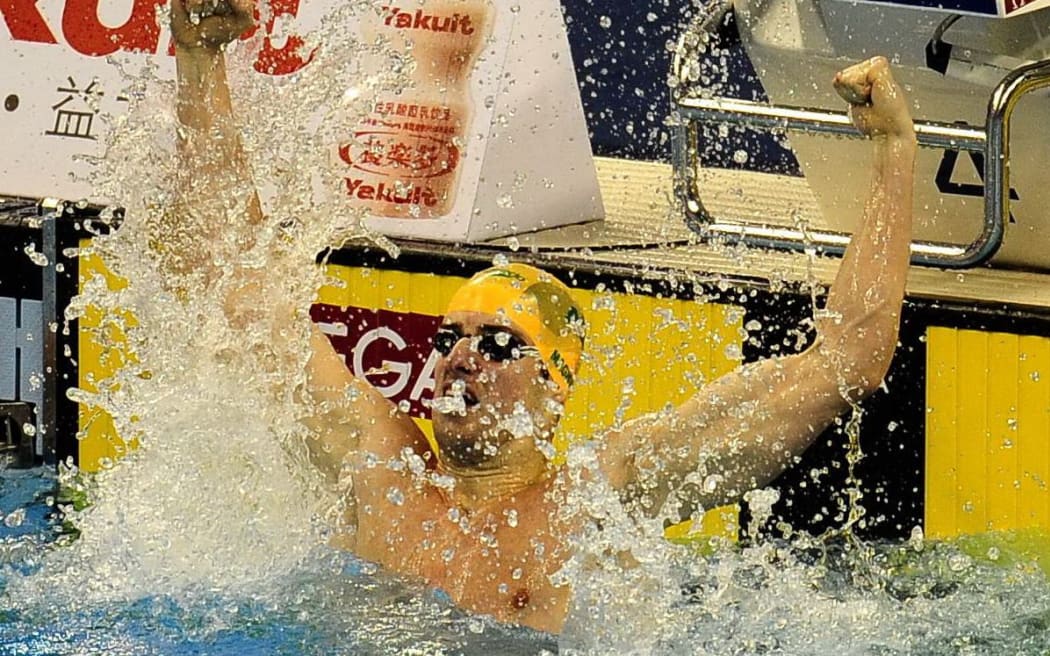The Enhanced Games aim to test the limits of drug-assisted human potential

Australian swimmer James Magnussen celebrates winning the gold medal in the men's 100m freestyle at the world champs in Shanghai in 2011. Photo: CSPA/Photosport
Former Olympic swimmer James Magnussen has already started training for the Enhanced Games, but he won't start taking performance-enhancing substances until about nine months out from the competition.
The Australian world champion was the first athlete to be announced by Enhanced, but he says the organisation has had plenty of interest since he's come on board.
"Not all those athletes can be named at this stage, because some of them are still competing, some of them are in negotiations."
Enhanced, which has been dubbed 'the dope Olympics', was founded by billionaire Aron D'Souza, and is backed by investors including Peter Thiel (the co-founder of PayPal, who was controversially granted New Zealand citizenship).
The plan is to host an event with competitions in athletics, aquatics, gymnastics, strength and combat. Exactly when and where this will happen is yet to be determined, and if the International Olympic Committee had a vote, it wouldn't happen.
The current boss of the Australian Sports Commission, Olympic great Kieren Perkins, says the games are borderline criminal, and someone will die if they go ahead - he doesn't think they will actually happen.
Former Olympian Ben Sandford, who represented New Zealand in skeleton, tells The Detail he's also against such an event, and believes the finer details of where and when it takes place may be a challenge.
"Where do you hold this event?" he asks. "In some countries that's going to be easier than other countries just because of the way anti-doping rules or anti-doping legislation is in those countries."
Doping in elite sport has long been banned, though Magnussen says that doesn't mean it doesn't happen.
"During my career I was well aware that there were athletes that were skirting those rules, and countries that were doing the same.
"Every Olympic athlete knows that they're competing against certain athletes that are cheating.
"That's just part and parcel I think of why this is a really interesting concept because some people say cheating, but cheating is actually already prevalent in clean sport, so this may be the first time in history there truly has been an even playing field where things are open and honest rather than done in the shadows."
For Magnussen, the draw to compete is three-fold.
"The first thing is as a 32-year-old now I sometimes sit back and think 'I wonder what I could have achieved with a 32-year-old mind in a 20-year-old body,' and most other athletes I speak to echo that sentiment. It would be great to have the wisdom, the perspective on life, the hindsight of a person in their 30s in the body of their 20-year-old self; when you could basically conquer the world physically but were so immature and unexperienced mentally," he says.
The second draw for him is the opportunity to do the fastest 50m freestyle swim in history. The goal is a sub-20.9 seconds. His record was 21.5.
"Then probably the third and final part of that, in that order as well, is the monetary part."
That monetary part is a $US1 million prize.
Though there is a stigma about doping in sport, Magnussen says that the conversations he's had with other athletes about his decision to dope have been good.
"Amongst other athletes it's always been a really positive response, I think athletes like myself consider it a really interesting opportunity, either post-career or later in their career, for some of them maybe even as an alternative to their current career," he says.
The reason it might be a good alternative is because of the monetary incentive.
For Sandford, having a financial motivation to take performance-enhancing drugs is a worry, because it could lead to exploitation of athletes.
"I guess the danger is that there is a duty of care that you would expect of anyone who's holding a sporting event and if they have these incentives to encourage athletes to dope there's obviously a risk for those athletes. There's also a risk for the wider sporting environment that more people will see this and believe that they can do this as well and probably be doing it without the care and diligence that these athletes might be afforded."
He's also not convinced that it will work.
"I actually don't think there'd be a massive difference, we've gone through periods in sport and in certain sports where there has been a lot of doping and the average viewer, the average person looking at it hasn't necessarily been able to differentiate between the doped athlete and the non-doped athlete."
Sandford says adding performance enhancing drugs take away from it.
"It's taking away the sport from the sport, and that's part of what bothers me about it.
"It really is just taking advantage of people for entertainment purposes, it's producing a spectacle without the competition.
"There was some runner saying he can run faster than Usain Bolt because he's enhanced, that's all very well but you're not even competing in the same race, mate.
"They're two different things, they're not comparable."
That's something that Magnussen agrees on.
"It won't be a legitimate world record obviously, we're not comparing it to the actual world record, it won't be written in books," he says. "But we're aiming to do the fastest swim which is really exciting."
Check out how to listen to and follow The Detail here.
You can also stay up-to-date by liking us on Facebook or following us on Twitter.


